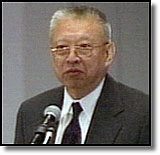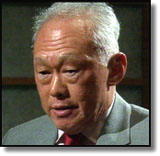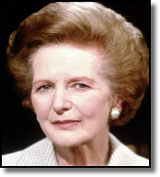
|
Tung Chee-Hwa - Chief Executive of Hong KongTung Chee-Hwa, Hong Kong's new leader, was appointed the chief executive-designate of Hong Kong on December 11, 1996. He received 80% of the votes of the Chinese-appointed selection committee. The 59-year-old businessman had become favourite for the job when Chinese President and Communist Party General Secretary Jiang Zemin seemingly singled him out for a warm handshake at a meeting.Tung is the eldest son of the late shipping tycoon CY Tung. He was born in Shanghai in 1937 to a privileged background and educated in China, Hong Kong and the United Kingdom at Liverpool University, where he read mechanical engineering and watched Liverpool football club play at Anfield. After living in the US for almost a decade, working for General Electric, he returned to Hong Kong in 1969 and worked in his father's shipping empire. He eventually became chairman and chief executive officer of Orient Overseas (International) Limited, a Hong Kong listed investment holding company. Some of his experiences in the West may well have shaped his conservative views. In an interview he stated, "I lived in America during the '60s. I saw what happened with the slow erosion of authority, and the society became less orderly than is desirable. I certainly don't want to see this happen [in Hong Kong]." Before becoming chief executive designate, Tung served as a member of Chris Patten's Executive Council for four years. Tung then became a high-level adviser of the Chinese government as vice-chairman of the Preparatory Committee and a member of the Chinese People's Political Consultative Committee. Tung has a strong attachment to the traditional Chinese values of family, thrift, conformity and consensus with the overriding desire for stability. When his father died in 1982, the family empire was on the brink of financial ruin. At a critical moment, Henry Fok, a businessman with close connections to the Communist Party leadership in Beijing, offered to bail him out with $120m. Recently, Tung acknowledged that some of the cash came from mainland Chinese funds and as a result, he has been seen as owing a political debt to Beijing. This has helped Tung to be seen as a figure who could work easily in the very different worlds of Hong Kong and China, and he has cultivated friends and allies in both. Tung and his team have expressed concern at their image, particularly in the foreign press. They have blamed the British Colonial Government and Martin Lee, chairman of the Democratic Party, for 'bad-mouthing' them. The early actions of Tung as chief executive designate were poorly received and badly managed in terms of press relations, notably his strong initial backing of China's proposals on civil liberties and his attacks on Lee. He has also come under fire for opposing foreign donations to Hong Kong political parties, when he himself donated a large sum to the British Conservative Party for the 1992 General Election. Criticism has centred on the recommendations of the legal sub-group of the Preparatory Committee to restore draconian laws, raising concern that freedom of expression could be impaired after the handover. After very strong protests, some of the original proposals over political funding and freedom of expression have now been watered down, but concern remains among democratic groups. Even before the handover, Tung was forced to walk a tightrope between aggravating Hong Kong and world opinion, and being seen as weak and unreliable by Beijing and the pro-Beijing forces inside Hong Kong. Some insiders claim that Tung needs to act tough early on to establish his credibility with Beijing in order to give him room to manoeuvre in his new role as head of the Special Administrative Region that is Hong Kong. Since he began his campaign for the post, Tung asserted that what Hong Kong people care most about is not protests and politics, but issues like housing and education and he has promised to pursue these vigorously in office. Tung is a classic Conservative Hong Kong pro-Chinese businessman, with an aversion to democracy and elected legislatures. Perhaps his style of government can be discerned if not from his friends then from those he admires. He has named three model leaders: the late Deng Xiaoping of China, former Singaporean Prime Minister Lee Kuan Yew, and Margaret Thatcher.
|
|||||||||||
Diana, Princess of Wales, 1961-1997
Conference 97
Devolution
The Archive
News |
Issues |
Background |
Parties |
Analysis |
TV/Radio/Web
Interactive |
Forum |
Live |
About This Site
News |
Issues |
Background |
Parties |
Analysis |
TV/Radio/Web
Interactive |
Forum |
Live |
About This Site
© BBC 1997 |
politics97@bbc.co.uk |



